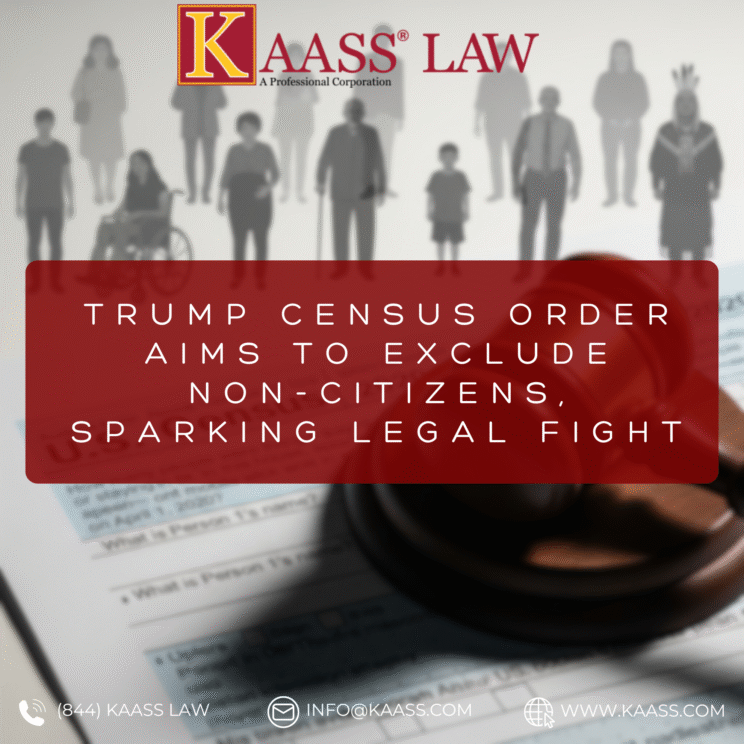President Donald Trump recently announced a directive that could fundamentally alter political power in the United States. He has ordered the Commerce Department to begin work on a new, mid-decade census. The primary goal of this new Trump Census Order is to explicitly exclude undocumented immigrants from the population count that determines congressional representation. This move immediately sparked outrage from civil rights groups and Democratic leaders. Consequently, they have labeled it unconstitutional and are preparing for a major legal battle.
This executive action reignites a contentious fight from the president’s first term. It also has massive implications for states with large immigrant populations, particularly California. Understanding the order’s directives, its potential impact, and the strong legal arguments against it is crucial.
What the Trump Census Order Aims to Do
In a social media post, President Trump stated he had instructed the Department of Commerce to work on a “new and highly accurate CENSUS.” He explicitly declared, “People who are in our Country illegally WILL NOT BE COUNTED IN THE CENSUS.”
The U.S. Constitution mandates a full census every 10 years. However, federal law does permit mid-decade surveys for statistical purposes. The law generally forbids using these mid-decade counts for reapportioning seats in the House of Representatives. The president’s directive appears to challenge this. Ultimately, it aims to create a new apportionment base before the 2026 midterm elections.
The Goal: Reshaping the Electoral Map
The administration’s objective is clear. It wants to change how congressional districts and Electoral College votes are distributed among the states. For over 200 years, the established method has been based on the total number of residents in each state, regardless of citizenship.
Excluding undocumented immigrants would cause a significant shift in political power. It would move power away from states with large immigrant populations.
- Impact on States: A Pew Research Center analysis from a previous attempt at this policy found that excluding undocumented immigrants would likely cause California, Texas, and Florida to each lose a congressional seat.
- Redistricting Battles: This order also arrives amid fierce partisan battles over redistricting. A new population count could give some states a legal basis to redraw their congressional maps to favor one party.
The Constitutional Conflict with the Trump Census Order
The central legal challenge to the Trump Census Order is the U.S. Constitution itself. Critics argue the order directly violates the plain language of the 14th Amendment.
The 14th Amendment’s “Whole Number of Persons” Clause
Section 2 of the 14th Amendment states, “Representatives shall be apportioned among the several States according to their respective numbers, counting the whole number of persons in each State…” For centuries, courts and the Census Bureau have interpreted “whole number of persons” to mean every resident. This includes non-citizens. Opponents argue the president cannot unilaterally change this constitutional mandate.
Previous Legal Fights
During his first term, President Trump made two major efforts to alter the census:
- Adding a Citizenship Question: In 2019, the Supreme Court blocked his administration from adding a citizenship question to the 2020 census.
- The 2020 Exclusion Memo: Later, in 2020, he issued a memorandum to exclude undocumented immigrants from the apportionment count. Courts blocked this illegal plan.
President Biden rescinded that memo. However, President Trump has now revived the policy.
The Legal Road Ahead for the Trump Census Order
Legal experts and civil rights organizations promise swift lawsuits to block this new order. Groups like the ACLU have previously fought similar efforts. They argue that such moves are an unconstitutional attack on immigrant communities.
The legal arguments will likely focus on several key points:
- The order violates the 14th Amendment.
- The president is exceeding his executive authority.
- The order is arbitrary and lacks a sound legal or logistical basis.
How This Affects Californians
For California, the stakes in this fight are immense. Our state is home to the largest immigrant population in the country. Excluding residents from the census count would have severe consequences.
- Loss of Representation: California would almost certainly lose at least one seat in the U.S. House of Representatives. This would diminish the state’s voice in Congress.
- Reduced Federal Funding: Billions of dollars in federal funding support critical services like healthcare, schools, and roads. An undercount would mean California receives a smaller share of these federal funds, impacting every resident.
How KAASS LAW Can Help
The new Trump Census Order creates a climate of fear, particularly within immigrant communities. While national organizations will fight this constitutional battle, its effects are personal. At KAASS LAW, our attorneys are dedicated to protecting the rights of individuals and families.
Our Immigration practice helps clients navigate the complex U.S. immigration system. We understand policies like this can have a chilling effect. We provide clear, confidential advice to help our clients understand their rights. If you have questions about your immigration status, please Contact Us for a consultation.
Conclusion
The Trump Census Order to exclude undocumented immigrants directly challenges the Constitution. It aims to fundamentally reshape political power. Furthermore, it threatens California’s representation and federal funding. While the order’s legality is highly questionable, it guarantees an immediate and fierce legal battle. The outcome will have lasting implications for the meaning of representation in our democracy

